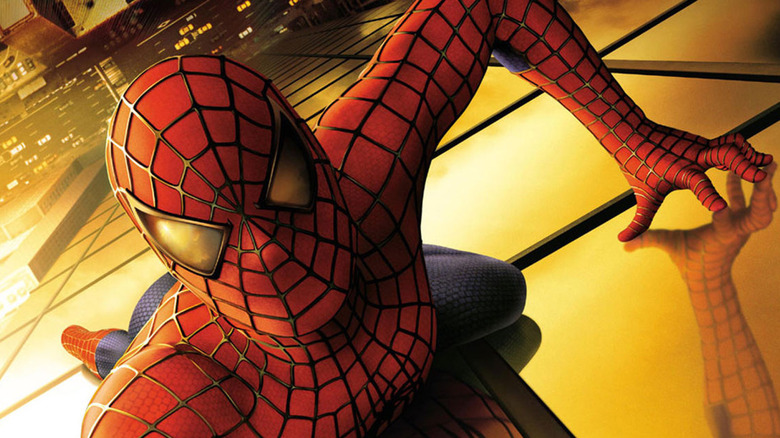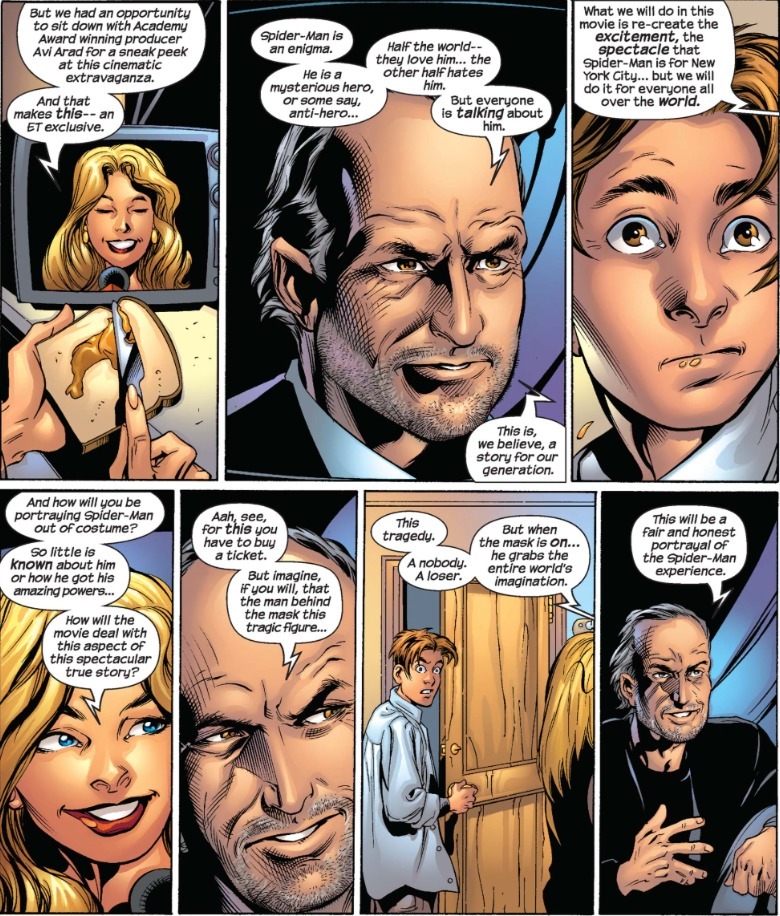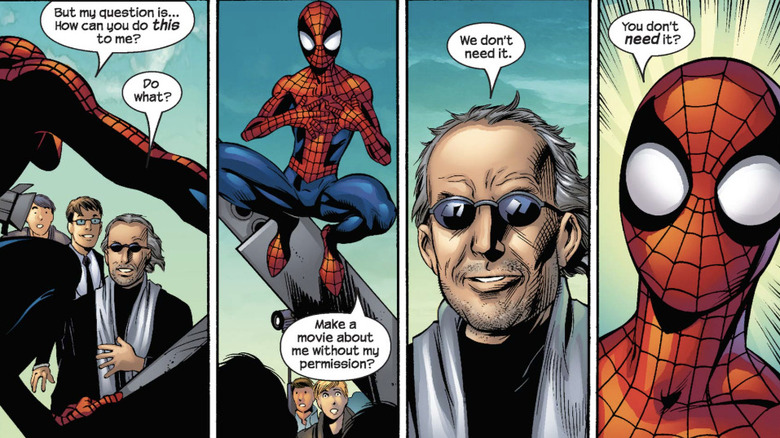Spider-Man Producer Avi Arad Had A Wild Cameo In This Marvel Comic
We may receive a commission on purchases made from links.
The early 2000s saw the reimagination of Stan Lee and Steve Ditko's amazing fantasy of Spider-Man, with a back-to-the-beginning retelling that reintroduced the hero to younger audiences. Wait, do you think I'm talking about the Sam Raimi-directed, Tobey Maguire-starring "Spider-Man" movies? Two years before "Spider-Man" swung into theaters, writer Brian Michael Bendis and artist Mark Bagley debuted the comic reboot "Ultimate Spider-Man." "Ultimate" brought Spider-Man into the 21st century. For millennial nerds, the definitive Spider-Man is either Raimi's or Bendis'.
The "Spider-Man" movie harkens back to the tone of Lee/Ditko comics. However, it also drew some influence from "Ultimate Spider-Man," mostly in streamlining the classic Spider-Man supporting cast (i.e. making MJ and Harry Osborn Peter Parker's High School classmates). Bendis and Bagley repaid the favor in "Ultimate Spider-Man" volume 10 (issues #54-59), titled "Hollywood."
The story centers around the production of an in-universe "Spider-Man" movie... which Peter, because of his secret identity, will earn no money from. "Hollywood" was published in early 2004, weeks ahead of the theatrical release of "Spider-Man 2." The whole story parallels the excitement of a real "Spider-Man" movie coming out at the time of its publication. That's also why the villain of the arc is Doctor Octopus, the villain of "Spider-Man 2." In "Hollywood," Otto sports a brown trench coat that resembles Alfred Molina's silver screen Doc Ock costume.
The arc gets extra meta with a couple cameos. The in-universe "Spider-Man" movie stars Tobey Maguire as Spider-Man, is being directed by Sam Raimi, and produced by Avi Arad (founder and then-chairman and CEO of Marvel Studios). If Bendis had the foresight of Madame Web, maybe he would've also included future Marvel Studios President Kevin Feige, who worked as a producer on the Raimi "Spider-Man" films.
Arad gets the most page time, such as a scene in issue #54 where Peter first learns about the movie and sees Arad being interviewed for it on TV.
Though Arad has producing credits on many Marvel movies, he's most associated with Spider-Man. Some of his creative decisions have made him (in)famous among Spidey fans. For instance, Arad was the one who pushed to include Venom in "Spider-Man 3," over Raimi's objections, because of how popular the villain is. That's genuinely regarded to have been a mistake; even Arad said mea culpa in a 2018 interview with Screen Rant. Arad was also a producer on Sony's "Spider-Man Cinematic Universe" movies (no Spider-Man included), so some have laid those movies' failures at his feet.
How positively (or not) does Arad's cameo in "Ultimate Spider-Man" depict him?
Ultimate Spider-Man parodied the Spider-Man movies
Bagley draws Arad, Raimi, and Maguire in their own likenesses. Arad wears a black outfit like he is known to favor in real life, plus the blue-lens sunglasses he wound up wearing to the "Spider-Man 2" premiere. The comic mostly uses Arad as a stock character, the unscrupulous movie producer. He's the one who rubs it in Spider-Man's face that they don't need his permission to make the movie, and he has cameraman shoot footage of the real Spider-Man to save money on the effects budget. He does offer to cut Spider-Man a check if he reveals his secret identity, but of course Peter doesn't do that.
Raimi is shown wearing a suit while directing the movie, as he is famous for doing in real life. When Spider-Man crashes the set in protest, he shouts: "'Evil Dead 2' was cool, but the rest of you suck."
Bendis has never been shy about pop culture references. It's part of what makes his dialogue famously snappy; Bendis' Spider-Man would joke about Carson Daly and "Buffy The Vampire Slayer" the same way that Stan Lee's Spider-Man would make cracks about Ed Sullivan and Johnny Carson.
"Hollywood" is filled with similar in-jokes. Doc Ock observes that he thought Spider-Man's web-shooters were organic, which they genuinely are in the Raimi movies. One of the villains of the movie is also Mysterio, Spider-Man's movie-themed villain (he's a former special effects artist who uses his skills to create illusions), who in this world is as fictional as he is in the real one. Between his fishbowl head and cheesy name, Mysterio was a bit too hokey for the cool "Ultimate" universe, but "Hollywood" let Bendis sneak him in.
Now, "Hollywood" probably sounds like a silly arc. It starts as one, but it turns dark. For one, Doc Ock overpowers and kidnaps Spider-Man to torture him. He knocks one of Peter's teeth loose and then pulls it out with his tentacles, evoking the dental torture in "Marathon Man." Peter's friend Gwen Stacy is incensed about the Spider-Man movie, too, because she thinks Spider-Man killed her father (it was really an imposter). In this arc, she discovers Peter's secret identity and pulls a gun on him, forcing Peter to talk her down.
Mostly, "Hollywood" is another lesson in the Parker luck. Only Peter Parker could have a movie made about him and then have it lead to some of the worst days of his life.


